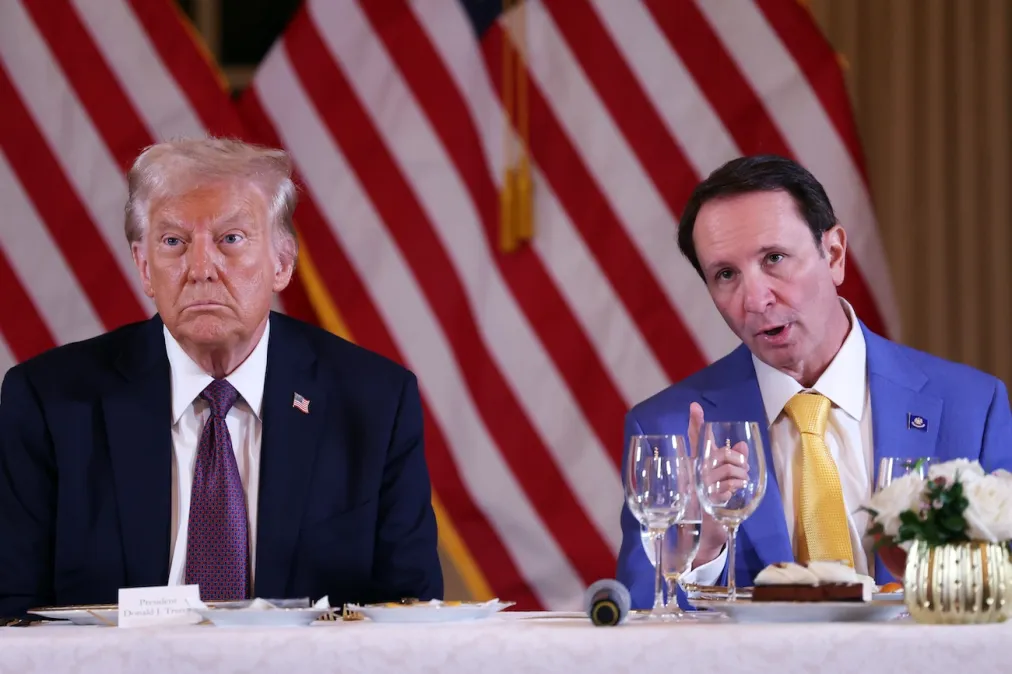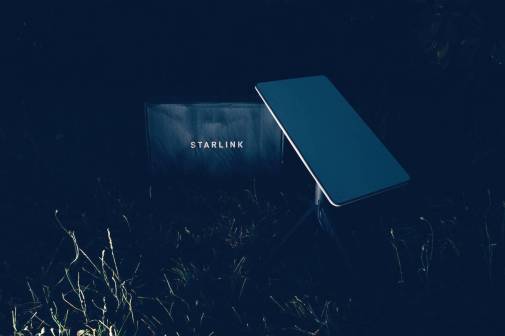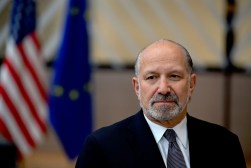Louisana governor asks Commerce Dept. for easier path to spend BEAD money on satellite internet

Louisiana Gov. Jeff Landry, a Republican, on Wednesday sent a letter to the U.S. Department of Commerce asking for reforms to the National Telecommunications and Information Administration and its Broadband Equity, Access, and Deployment program, including easier paths for states to spend broadband grant money on satellite internet service.
In the letter addressed to Howard Lutnick, whom President Donald Trump has nominated as Commerce secretary, Landry asks the agency to consider reforms to the BEAD program, including a reclassification of low-earth orbit satellite and fixed wireless services as “reliable broadband services.” This would eliminate BEAD’s alternative technologies guidelines, which give preference to funding fiber, only allowing BEAD funds to be used to deploy the other technologies in certain circumstances.
Two of the most prominent satellite internet service providers are Starlink, operated Elon Musk’s SpaceX, and Amazon’s Project Kuiper.
The letter also asks the Commerce Department to consider eliminating reporting requirements for states and their vendors, and to streamline the approval process for BEAD funds.
The letter comes amid swirling uncertainty regarding BEAD’s future following an executive order signed Monday by President Donald Trump that paused the delivery of federal funds set aside by the Biden administration for infrastructure projects. It also comes after Louisiana became the first state on Jan. 13 to have its final BEAD proposal approved by the NTIA. However, on Tuesday the White House’s Office of Management and Budget shared a memo clarifying that Trump’s executive order only applied to funding for the projects under the “Green New Deal.”
Both Louisiana’s broadband program executive director and Herryn Herzog, a spokesperson at the Vermont Community Broadband Board, told StateScoop their BEAD funds will not be impacted by the executive order.
While the OMB memo clarifies that delivery of already approved BEAD funds are unaffected by the executive order, the Trump administration still has power to change BEAD rules and guidelines, which may impact the dozens of states that are either waiting for the NTIA to issue an approval on their final proposals, or are still selecting vendors.
The letter from Landry, which was shared with StateScoop by Veneeth Iyengar, executive director of Louisana’s ConnectLA, the state’s Office of Broadband Development and Connectivity, names several reasons why BEAD policy reforms are necessary. Iyengar told StateScoop the intent of Landry’s ask is to give support to the Trump administration in reforming BEAD, and to serve as a “thought partner and sounding board.”
“The letter explains the speed at which we’re trying to move things, but I think what’s also important is we also recognize that — as the state that’s been moving the quickest — that we want to be a partner to the administration in terms of how we can reform the BEAD process in general to benefit and add value to other states,” Iyengar said.
In the letter, Landry also asks for the agency to consider eliminating BEAD policies that establish “separate rules and requirements for LEO and unlicensed wireless subgrants and disbursements; [and to] apply the same requirements to all technologies.” Additionally, the letter asks that there be no preference given to fiber and for states to be granted the ability to establish “a simple ex-ante cost per location” prior to the start of subgrantee selection, which would mean costs would be determined at the outset of the contract rather than upon completion of the work.
These potential regulatory changes, in addition to Landry’s suggestion of eliminating reporting obligations for states and vendors, Iyengar said, will help Louisiana “accelerate shovels in the ground.” Some of the reporting obligations he suggests the Commerce Department eliminate include: the requirement that subgrantees provide copies of their cybersecurity and supply chain risk management plans to state officials; an explanation from the state on how they plan to address climate change and prohibit states imposing climate change-related obligations on BEAD-funded providers; and the requirement that states report the number and amount of contracts and subcontracts won by minority- or woman-owned businesses, among other workforce reports.
Iyengar told StateScoop that state laws render some of these reporting requirements redundant.
“We have state law that undergirds accountability for all of the work that we do, right? And so, for example, we obligate funds to an Internet service provider,” he said. “They say they’re going to build a certain number of locations, and we’ll send a technical audit team to ensure the work has actually gotten done, that it’s met the state law of 100/20 [megabits per second]. … And that what they’re actually building is future and scalable and reliable.”
Iyengar said the state expects to spend 95% of its $1.3 billion of BEAD funding to connect 140,030 households and businesses on fiber, with the remaining 5% going to cable, fixed wireless and satelitte. In its final proposal, Louisiana allocated $28.7 million to an “unnamed alternative technology provider” to cover nearly 2,900 locations, with the funds will most likely going to Starlink or Project Kuiper. Iyengar told StateScoop he hopes to have most subgrantee agreements, if not all of them, signed over the next several weeks.
When asked about how he’d respond to criticism of the governor’s ask to remove barriers to states awarding BEAD funds to LEO satellite internet providers, particularly as it stands to create financial benefits for Starlink and SpaceX owner Elon Musk — whom Trump named as the lead administrator of his Department of Government Efficiency — or Project Kuiper and Amazon owner Jeff Bezos, who notably, among other technology billionaires, received a front-row invitation to attend Trump’s inauguration earlier this week, Iyengar stated that the ask is intended to “provide more flexibility for states to choose their own path.”
“At the end of the day, it boils down to again — and I’m going to repeat this, because fundamentally we believe this, and the governor believes this — I’ve got to solve a problem for people in 64 different parishes, and there’s not a one-size-fits-all solution that can impact every one of those individuals,” Iyengar said. “Some are going to require fiber, some are going to require LEOs, and from our perspective, we’re gonna use the free market to decide who we think is gonna be the best provider for those folks. How another state chooses to sort of determine that technology mix is up to them — who they decide to partner with is entirely up to them.”
Colin Wood contributed reporting.






